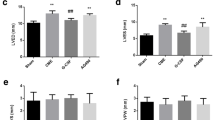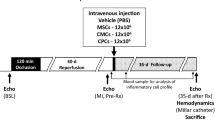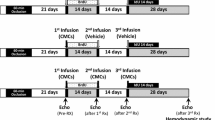Abstract
Objective
The effect of granulocyte colony-stimulating factor (G-CSF) on post-infarct ventricular remodeling remains controversial. We hypothesized that the timing of G-CSF administration after myocardial ischemia plays an important role in determining its efficacy.
Methods
Rat myocardial ischemia was induced by 60 min coronary ligation and reperfusion. Surviving animals received G-CSF after 1 h (E-G) or 24 h (D-G) of reperfusion randomly at 100μg/kg/d for five consecutive days. 7 days or 3 months post-ischemia, rat hearts were quickly removed for ex vivo electrophysiological measurements or histological analysis (collagen disposition and angiogenesis) and metalloproteinase-2 and −9 activity assays (gelatin zymography). Left ventricular (LV) invasive hemodynamic analysis was performed in 3-month recovery animals before sacrifice.
Results
At 3 months post ischemia, LV mechanical remodeling was further impaired with early G-CSF administration (0.65 ± 0.17%, 13.21 ± 7.36 mmHg, −4,684 ± 1,560 mmHg/s) compared with the control group (0.28 ± 0.12%, 6.45 ± 3.43 mmHg, −6,267 ± 1,111 mmHg/s) and D-G group (0.34 ± 0.12%, 7.90 ± 5.33 mmHg, −6,227 ± 1,075 mmHg/s) as shown by increased expansion index (P < 0.01), deterioration of myocardial function with increased LVDP (P < 0.05), and decreased −dP/dt max (P < 0.05). By contrast, there was a significant increase in electrical properties including monophasic action potential (MAP) 90 dispersion (12.58 ± 4.46 vs. 30.56 ± 6.17 ms at 7 days; 18.54 ± 4.31 vs. 34.78 ± 5.24 ms at 3 months; P < 0.05 for both) and inducibility of ventricular arrhythmias (4.78 ± 1.19 vs. 11.58 ± 2.76 ms at 3 months; P < 0.05) with early G-CSF treatment compared with the control group.
Conclusions
Both early and delayed administrations of G-CSF can improve electrophysiological properties after myocardial ischemia, but have no beneficial effects on LV mechanical remodeling.







Similar content being viewed by others
References
Brunner S, Huber BC, Fischer R, Groebner M, Hacker M, David R, et al. G-CSF treatment after myocardial infarction: impact on bone marrow-derived vs cardiac progenitor cells. Exp Hematol. 2008;36:695–702.
Pasquet S, Sovalat H, Henon P, Bischoff N, Arkam Y, Ojeda-Uribe M, et al. Long-term benefit of intracardiac delivery of autologous granulocyte-colony-stimulating factor-mobilized blood CD34+ cells containing cardiac progenitors on regional heart structure and function after myocardial infarct. Cytotherapy. 2009;11:1002–15.
Harada M, Qin Y, Takano H, Minamino T, Zou Y, Toko H, et al. G-CSF prevents cardiac remodeling after myocardial infarction by activating the Jak-Stat pathway in cardiomyocytes. Nat Med. 2005;11:305–11.
Ueda K, Takano H, Hasegawa H, Niitsuma Y, Qin Y, Ohtsuka M, et al. Granulocyte colony stimulating factor directly inhibits myocardial ischemia-reperfusion injury through Akt-endothelial NO synthase pathway. Arterioscler Thromb Vasc Biol. 2006;26:e108–13.
Misao Y, Takemura G, Arai M, Ohno T, Onogi H, Takahashi T, et al. Importance of recruitment of bone marrow-derived CXCR4+ cells in post-infarct cardiac repair mediated by G-CSF. Cardiovasc Res. 2006;71:455–65.
Werneck-de-Castro JP, Costa ESRH, de Oliveira PF, Pinho-Ribeiro V, Mello DB, Pecanha R, et al. G-CSF does not improve systolic function in a rat model of acute myocardial infarction. Basic Res Cardiol. 2006;101:494–501.
Cho SW, Gwak SJ, Kim IK, Cho MC, Hwang KK, Kwon JS, et al. Granulocyte colony-stimulating factor treatment enhances the efficacy of cellular cardiomyoplasty with transplantation of embryonic stem cell-derived cardiomyocytes in infarcted myocardium. Biochem Biophys Res Commun. 2006;340:573–82.
Lehrke S, Mazhari R, Durand DJ, Zheng M, Bedja D, Zimmet JM, et al. Aging impairs the beneficial effect of granulocyte colony-stimulating factor and stem cell factor on post-myocardial infarction remodeling. Circ Res. 2006;99:553–60.
Ohtsuka M, Takano H, Zou Y, Toko H, Akazawa H, Qin Y, et al. Cytokine therapy prevents left ventricular remodeling and dysfunction after myocardial infarction through neovascularization. FASEB J. 2004;18:851–3.
Kuhlmann MT, Kirchhof P, Klocke R, Hasib L, Stypmann J, Fabritz L, et al. G-CSF/SCF reduces inducible arrhythmias in the infarcted heart potentially via increased connexin43 expression and arteriogenesis. J Exp Med. 2006;203:87–97.
Deindl E, Zaruba MM, Brunner S, Huber B, Mehl U, Assmann G, et al. G-CSF administration after myocardial infarction in mice attenuates late ischemic cardiomyopathy by enhanced arteriogenesis. FASEB J. 2006;20:956–8.
Orlic D, Kajstura J, Chimenti S, Limana F, Jakoniuk I, Quaini F, et al. Mobilized bone marrow cells repair the infarcted heart, improving function and survival. Proc Natl Acad Sci USA. 2001;98:10344–9.
Yoshioka T, Takahashi M, Shiba Y, Suzuki C, Morimoto H, Izawa A, et al. Granulocyte colony-stimulating factor (G-CSF) accelerates reendothelialization and reduces neointimal formation after vascular injury in mice. Cardiovasc Res. 2006;70:61–9.
Okada H, Takemura G, Li Y, Ohno T, Li L, Maruyama R, et al. Effect of a long-term treatment with a low-dose granulocyte colony-stimulating factor on post-infarction process in the heart. J Cell Mol Med. 2008;12:1272–83.
Louzada RA, Oliveira PF, Cavalcanti-de-Albuquerque JP, Cunha-Carvalho L, Baldanza MR, Kasai-Brunswick TH, et al. Granulocyte-colony stimulating factor treatment of chronic myocardial infarction. Cardiovasc Drugs Ther. 2010;24:121–30.
Sumi S, Kobayashi H, Yasuda S, Iwasa M, Yamaki T, Yamada Y, et al. Postconditioning effect of granulocyte colony-stimulating factor is mediated through activation of risk pathway and opening of the mitochondrial KATP channels. Am J Physiol Heart Circ Physiol. 2010;299:H1174–82.
Cheng Z, Ou L, Liu Y, Liu X, Li F, Sun B, et al. Granulocyte colony-stimulating factor exacerbates cardiac fibrosis after myocardial infarction in a rat model of permanent occlusion. Cardiovasc Res. 2008;80:425–34.
Cheng Z, Liu X, Ou L, Zhou X, Liu Y, Jia X, et al. Mobilization of mesenchymal stem cells by granulocyte colony-stimulating factor in rats with acute myocardial infarction. Cardiovasc Drugs Ther. 2008;22:363–71.
Ripa RS, Jorgensen E, Wang Y, Thune JJ, Nilsson JC, Sondergaard L, et al. Stem cell mobilization induced by subcutaneous granulocyte-colony stimulating factor to improve cardiac regeneration after acute ST-elevation myocardial infarction: result of the double-blind, randomized, placebo-controlled stem cells in myocardial infarction (STEMMI) trial. Circulation. 2006;113:1983–92.
Zohlnhofer D, Ott I, Mehilli J, Schomig K, Michalk F, Ibrahim T, et al. Stem cell mobilization by granulocyte colony-stimulating factor in patients with acute myocardial infarction: a randomized controlled trial. JAMA. 2006;295:1003–10.
Achilli F, Malafronte C, Lenatti L, Gentile F, Dadone V, Gibelli G, et al. Granulocyte colony-stimulating factor attenuates left ventricular remodelling after acute anterior STEMI: results of the single-blind, randomized, placebo-controlled multicentre STem cEll Mobilization in Acute Myocardial Infarction (STEM-AMI) Trial. Eur J Heart Fail. 2010;12:1111–21.
Overgaard M, Ripa RS, Wang Y, Jorgensen E, Kastrup J. Timing of granulocyte-colony stimulating factor treatment after acute myocardial infarction and recovery of left ventricular function: results from the STEMMI trial. Int J Cardiol. 2010;140:351–5.
Fan L, Chen L, Chen X, Fu F. A meta-analysis of stem cell mobilization by granulocyte colony-stimulating factor in the treatment of acute myocardial infarction. Cardiovasc Drugs Ther. 2008;22:45–54.
Landazuri N, Taylor WR. Mobilizing bone marrow progenitor cells, a double edge sword. Cardiovasc Drugs Ther. 2008;22:339–41.
Baldo MP, Davel AP, Nicoletti-Carvalho JE, Bordin S, Rossoni LV, Mill JG. Granulocyte colony-stimulating factor reduces mortality by suppressing ventricular arrhythmias in acute phase of myocardial infarction in rats. J Cardiovasc Pharmacol. 2008;52:375–80.
Lee TM, Chen CC, Chang NC. Granulocyte colony-stimulating factor increases sympathetic reinnervation and the arrhythmogenic response to programmed electrical stimulation after myocardial infarction in rats. Am J Physiol. 2009;297:H512–22.
Nian M, Lee P, Khaper N, Liu P. Inflammatory cytokines and postmyocardial infarction remodeling. Circ Res. 2004;94:1543–53.
Zhou X, Li YM, Ji WJ, Jiang TM, Sun XN, Zhu Y, et al. Phenytoin can accelerate the healing process after experimental myocardial infarction? Int J Cardiol. 2006;107:21–9.
Li XH, Zhou X, Zeng S, Ye F, Yun JL, Huang TG, et al. Effects of intramyocardial injection of platelet-rich plasma on the healing process after myocardial infarction. Coron Artery Dis. 2008;19:363–70.
Fabritz L, Kirchhof P, Franz MR, Eckardt L, Monnig G, Milberg P, et al. Prolonged action potential durations, increased dispersion of repolarization, and polymorphic ventricular tachycardia in a mouse model of proarrhythmia. Basic Res Cardiol. 2003;98:25–32.
Franz MR, Kirchhof PF, Fabritz CL, Zabel M. Computer analysis of monophasic action potentials: manual validation and clinically pertinent applications. Pacing Clin Electrophysiol. 1995;18:1666–78.
Koller BS, Karasik PE, Solomon AJ, Franz MR. Relation between repolarization and refractoriness during programmed electrical stimulation in the human right ventricle. Implications for ventricular tachycardia induction. Circulation. 1995;91:2378–84.
Yumoto A, Fukushima Kusano K, Nakamura K, Hashimoto K, Aoki M, Morishita R, et al. Hepatocyte growth factor gene therapy reduces ventricular arrhythmia in animal models of myocardial ischemia. Acta Med Okayama. 2005;59:73–8.
Frangogiannis NG, Smith CW, Entman ML. The inflammatory response in myocardial infarction. Cardiovasc Res. 2002;53:31–47.
Angeli FS, Smith C, Amabile N, Shapiro M, Bartlett L, Virmani R, et al. Granulocyte colony stimulating factor in myocardial infarction with low ejection fraction. Cytokine. 2010;51:278–85.
Zbinden S, Zbinden R, Meier P, Windecker S, Seiler C. Safety and efficacy of subcutaneous-only granulocyte-macrophage colony-stimulating factor for collateral growth promotion in patients with coronary artery disease. J Am Coll Cardiol. 2005;46:1636–42.
Sutton MG, Sharpe N. Left ventricular remodeling after myocardial infarction: pathophysiology and therapy. Circulation. 2000;101:2981–8.
Whittaker P, Boughner DR, Kloner RA. Role of collagen in acute myocardial infarct expansion. Circulation. 1991;84:2123–34.
Whittaker P, Boughner DR, Kloner RA. Analysis of healing after myocardial infarction using polarized light microscopy. Am J Pathol. 1989;134:879–93.
Cleutjens JP, Verluyten MJ, Smiths JF, Daemen MJ. Collagen remodeling after myocardial infarction in the rat heart. Am J Pathol. 1995;147:325–38.
Kovacic JC, Muller DW, Graham RM. Actions and therapeutic potential of G-CSF and GM-CSF in cardiovascular disease. J Mol Cell Cardiol. 2007;42:19–33.
Meier P, Gloekler S, de Marchi SF, Indermuehle A, Rutz T, Traupe T, et al. Myocardial salvage through coronary collateral growth by granulocyte colony-stimulating factor in chronic coronary artery disease: a controlled randomized trial. Circulation. 2009;120:1355–63.
Abraham MR, Henrikson CA, Tung L, Chang MG, Aon M, Xue T, et al. Antiarrhythmic engineering of skeletal myoblasts for cardiac transplantation. Circ Res. 2005;97:159–67.
Peters NS, Coromilas J, Severs NJ, Wit AL. Disturbed connexin43 gap junction distribution correlates with the location of reentrant circuits in the epicardial border zone of healing canine infarcts that cause ventricular tachycardia. Circulation. 1997;95:988–96.
Roell W, Lewalter T, Sasse P, Tallini YN, Choi BR, Breitbach M, et al. Engraftment of connexin 43-expressing cells prevents post-infarct arrhythmia. Nature. 2007;450:819–24.
Kuwabara M, Kakinuma Y, Katare RG, Ando M, Yamasaki F, Doi Y, et al. Granulocyte colony-stimulating factor activates Wnt signal to sustain gap junction function through recruitment of beta-catenin and cadherin. FEBS Lett. 2007;581:4821–30.
Benzhi C, Limei Z, Ning W, Jiaqi L, Songling Z, Fanyu M, et al. Bone marrow mesenchymal stem cells upregulate transient outward potassium currents in postnatal rat ventricular myocytes. J Mol Cell Cardiol. 2009;47:41–8.
Katayama Y, Battista M, Kao WM, Hidalgo A, Peired AJ, Thomas SA, et al. Signals from the sympathetic nervous system regulate hematopoietic stem cell egress from bone marrow. Cell. 2006;124:407–21.
Acknowledgments
This work was supported by the National Natural Science Foundation of China (30740010, 30871072 and 81070121), the Tianjin Municipal Science and Technology Committee (09ZCZDSF04200), and intramural research programs from the Medical College of Chinese People’s Armed Police Forces (WJZ2007-3 and WKH2009Z01).
Author information
Authors and Affiliations
Corresponding author
Additional information
Hong-Mei Liu and Tao Luo contributed equally to this work.
Rights and permissions
About this article
Cite this article
Liu, HM., Luo, T., Zhou, X. et al. Disassociation Between Left Ventricular Mechanical and Electrical Properties in Ischemic Rat Heart After G-CSF Treatment. Cardiovasc Drugs Ther 25, 203–214 (2011). https://doi.org/10.1007/s10557-011-6294-8
Published:
Issue Date:
DOI: https://doi.org/10.1007/s10557-011-6294-8




